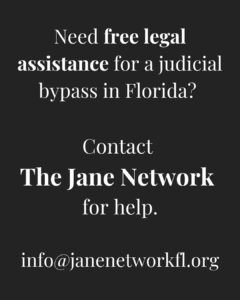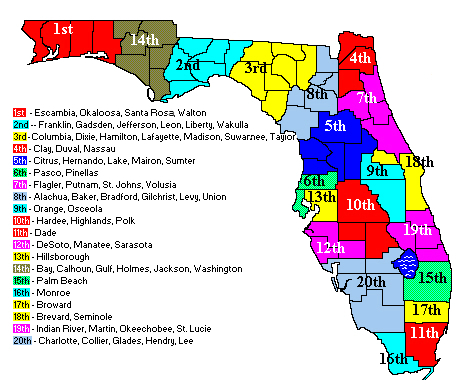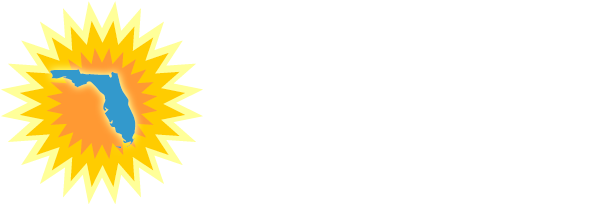 When a Florida young person can’t talk to their family about their abortion decision, they have the option of going for a judicial bypass, also called a judicial waiver or an “order”. A judicial bypass gives young people under 18 permission get an abortion without a parent’s involvement.
When a Florida young person can’t talk to their family about their abortion decision, they have the option of going for a judicial bypass, also called a judicial waiver or an “order”. A judicial bypass gives young people under 18 permission get an abortion without a parent’s involvement.
To get a judicial bypass, you must first apply in person at a courthouse. Most people go to the courthouse in their own county, but if you are concerned about privacy, you can go to a courthouse in another county, but it must be in the circuit where you live. Florida counties are grouped together to form 20 circuits, find your county on the map or list below to determine which circuit you live in.
Details on where to go and who to speak with in each county, where available, are listed in the table below. When applying for a judicial bypass, consider contacting the court clerk ahead of time to verify where to go and what to do to get started. There are some differences from county to county. Confirm their hours of operation, location, and parking.
There are two forms that must be completed. In some counties, a clerk will give you the forms to complete on your own, in others a clerk will assist you with completing the forms, while still in others a court-appointed lawyer will help you or even do it on your behalf after talking with you. See chart below for how forms are handled in your county.
- “Sworn Statement of True Name and Pseudonym” – This document makes sure that no one finds out about you going to Court to get this waiver. It lets you choose a different name for the Court to use, instead of your real name. Once this is filed the Court will refer to you by the initials or pseudonym that you chose. It protects your right to have the abortion without your parents or guardians knowing.
- “Judicial Bypass Petition” – This paper is a request of the judge. You can choose to write your own petition and bring it with you, or you can fill out this form. Your petition should include:
- Your pseudonym or initials (whichever you choose to use on your Sworn Statement of True Name and Pseudonym)
- Your age
- A statement that you are pregnant and that your parents do not know about your abortion and have not agreed to allow you to get an abortion
- A statement that you want to terminate your pregnancy (get an abortion)
- without telling your parent or legal guardian
- An explanation of why you want to terminate your pregnancy. There are 3 ways that you can get a judicial waiver from the judge. You have to prove at least 1 of those 3 reasons. If more than one applies to you then you should explain each reason that applies. The 3 reasons are that:
- you are sufficiently mature to decide on your own whether to have an abortion;
- you are a victim of child abuse or sexual abuse by one or both of your parents or guardians; or
- notifying a parent or legal guardian would not be in your best interest.
After you contact the courthouse, a private meeting (hearing) will be quickly scheduled where you will talk to a judge about why you are mature and well-informed enough to consent to your own abortion. For more detailed information on what the judge is trying to find out, see the next page “What will the judge consider?”
** If you are considering telling your parents about your decision and need help thinking about how to talk about it, you can find advice on this blog by our partner, Jane’s Due Process.

Related Questions
- Where do I go to get a judicial bypass?
- What forms do I need?
- What will the judge consider?
- Do I need a lawyer?
- How long does it take to get a judicial bypass?
- Does it cost money to get a judicial bypass?
- Will anyone know if I get a judicial bypass for abortion?
- What kinds of questions will the judge ask me?
- What do I wear to court?
- What happens if my hearing is scheduled during a school day?
- Does the other person involved in my pregnancy have a say about whether I choose to have an abortion?
- Do I have to be a US citizen to have an abortion? What if I don’t speak English well?
- Can I change my mind after I get the bypass?
- What if the judge denies my request for a bypass?
